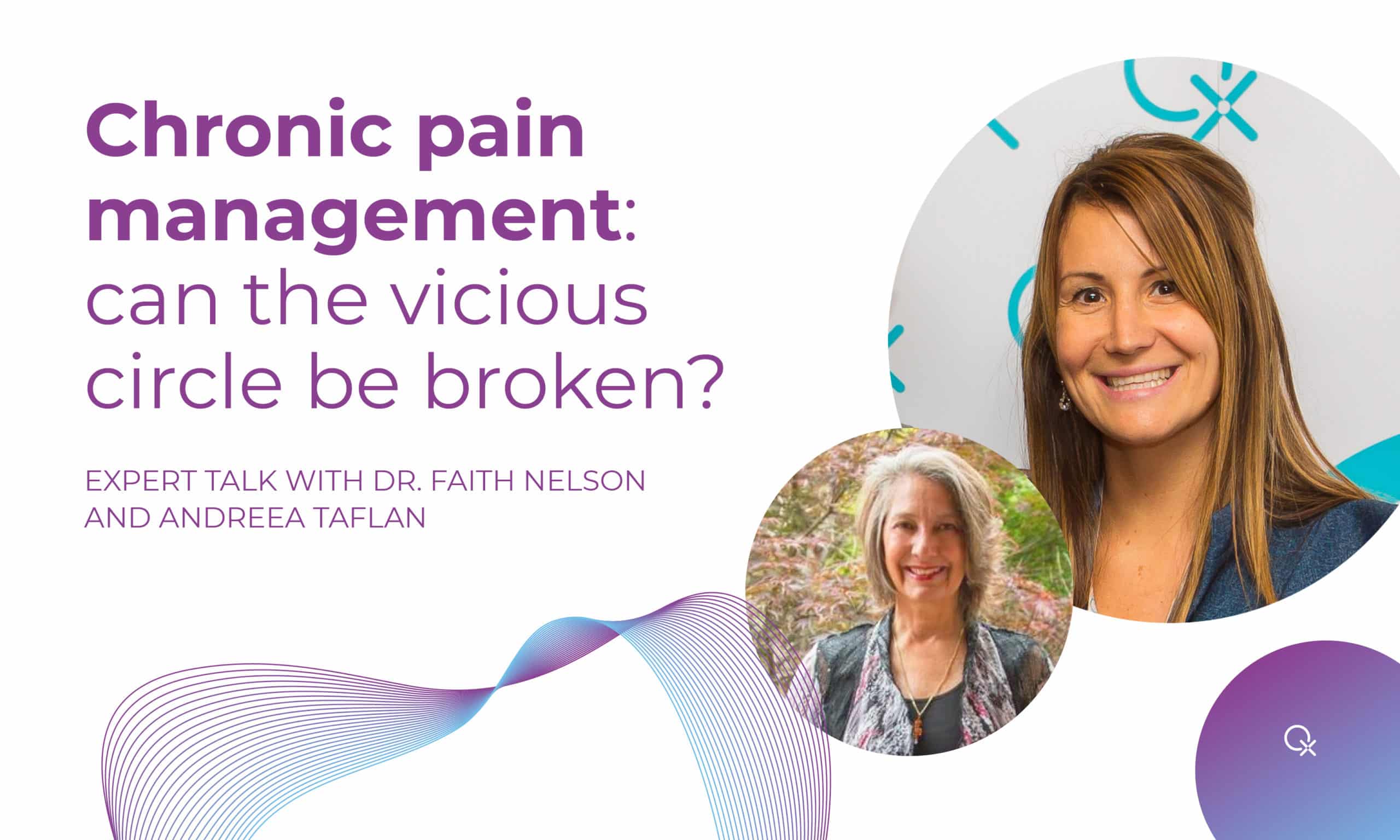
An estimated 50 million people in America experience some form of chronic pain despite taking prescription drugs and going through different types of treatment. In the QX Loop magazine sat down with Dr. Faith Nelson and biofeedback expert Andreea Taflan to discuss recent findings in chronic pain management that may help break the vicious circle for millions of patients worldwide.
Dr. Nelson: That, of course, is the million-dollar question. Each case is different, so that means the causes differ as well. However, I do believe – and I am certainly not alone in this – that there is a universal link between chronic pain and raised stress levels, and that the key to effectively dealing with chronic pain lies not in taking drugs but in acknowledging and breaking that link.
Andreea Taflan: Indeed, it’s this common link that is known as ‘the vicious circle’ of chronic pain, where stress and pain feed into one another. Stress hormones don’t just cause muscles to tense. They can also affect the body’s ability to control inflammation, making chronic pain feel even worse. Consequently, people who experience chronic pain become even more stressed, hypervigilant even, avoiding activity because they fear it will only worsen their pain. In their mind, leading a sedentary lifestyle is the only option. Meanwhile, and ironically enough, a lack of exercise will only make muscles weaken, which in turn makes pain levels rise.
Dr. Nelson: Just to be clear, as a registered nurse, I am not against prescription drugs. At the same time though, I am not blind to the negative effects they can have, as well as the fact that their effect is often only short-lived. That’s why I’ve dedicated my life to exploring alternative approaches to healthcare. When it comes to chronic pain management, biofeedback is definitively my favorite option because it is non-invasive yet can be very effective in the long run.
Andreea Taflan: I hear what you’re saying. I’m always advising people who are interested in biofeedback to continue their treatment. It’s an established fact that biofeedback can significantly improve the effects of medication and serve as a catalyst for different kinds of chronic pain management therapies. Pain management methods taught through biofeedback sessions are also known to ‘stick’ better. It’s like learning how to ride a bicycle. No matter how long it’s been, the brain will always remember the new pathways that have been created.
Dr. Nelson: People who suffer from chronic pain often feel helpless, as if they’ve lost all control over their body. Biofeedback sessions help them regain that feeling of being in control. A biofeedback therapist teaches them to sense when their stress levels are about to surge, and to put a stop to it through various mental and physical relaxation techniques.
Andreea Taflan: And if the biofeedback therapist uses a quantum feedback device, if I might add, handling stress and muscle tension becomes even easier for chronic pain patients as the device focuses on the unconscious parts of the autonomic nervous system. Patients can still try and master the various relaxation techniques, there’s no harm in that, but they don’t have to in order for the sessions to work. By attempting to re-educate the brain’s thinking processes, quantum biofeedback devices can increase the body’s ability to handle stress and pain even without a corresponding increase in bodily awareness on the side of the user.
Dr. Nelson: I certainly hope so. I’ve had surgery on my feet recently, due to a genetic condition, and chose to use alternative approaches for the recovery process. My orthopedic surgeon was amazed at the speed of healing, minimal swelling, and the lack of need for opiates for pain management. If other physicians, nurses, and health professionals would become more open to alternative healing approaches like this, it would contribute to a whole new paradigm of healing. One to which I feel everyone deserves to have access.
Dr. Faith Nelson (65) lives in Springfield, Missouri together with her husband Fred Eagles, an ordained minister and health consultant. She has a PhD in Integrative medicine and is certified in various fields including Biofeedback, Massage Therapy, and Reflexology/Acupressure. In 1990, she helped establish one of the first Integrative Health clinics in the Midwest within a mainstream medical hospital. Dr. Nelson lectures and consults internationally on Integrative Medicine.
Andreea Taflan is CEO and co-founder of QX World. She studied Business Management and Marketing and has a Master’s degree in Public Relations and Communications. Andreea was appointed as the right hand of the original developer of biofeedback technology in 2005. Since 2012 she has taken the lead in further developing the technology. Today, she is considered a leading expert in the field of biofeedback.
+1 (989) 681-1063
+1 (856) 322-8589